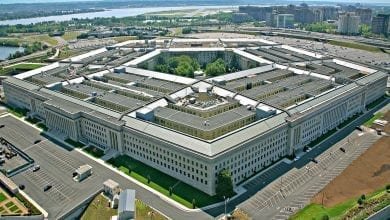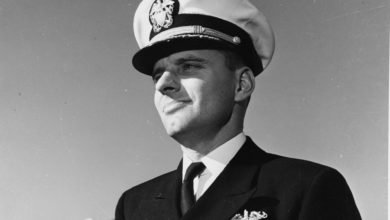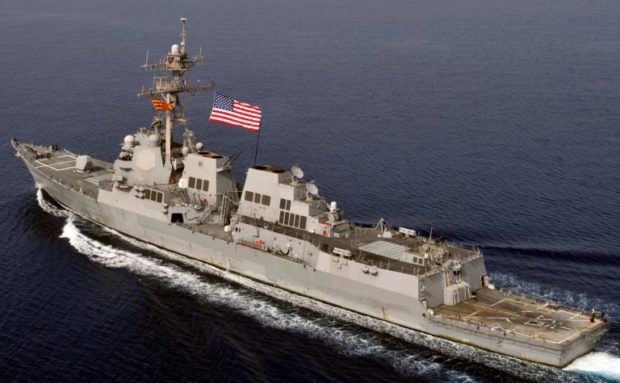Medal of Honor Monday: Marine Corps Capt. Everett Pope
Marine Corps Capt. Everett Pope was a seasoned officer by the time he landed on the small Pacific island of Peleliu during World War II, but little prepared him for what it took to survive there. His leadership while fighting devastating odds earned him the Medal of Honor.
Pope was born July 16, 1919, and grew up in Massachusetts, where he graduated from high school. He then attended Bowdoin College in Brunswick, Maine, and spent his junior year studying abroad in France. By October 1939, he returned to the United States fully aware of the increasing crisis in Europe.
“We could see what [war] could do. It was devastating, the world the French were living in at that point,” Pope recalled in an interview with the Library of Congress’ Veterans History Project. “I didn’t want to hang around and be drafted.”
So, four days after graduating from college in 1941, Pope joined the Marine Corps as an officer candidate. He got his commission just before the Pearl Harbor attacks and, a few months later, was sent off to the Pacific to fight.
“I was fluent in French, so of course the Marine Corps sent me to the southwest Pacific,” Pope joked.
The 23-year-old was part of the 1st Battalion, 1st Marines Regiment, 1st Marine Division, which first saw action in Guadalcanal in August 1942. There, Pope said, they learned jungle warfare skills they would need over the next two years. By September 1944, Army Gen. Douglass MacArthur, who fled the Philippines before their capture by the Japanese in 1942, was ready to return to the islands to retake them. But he needed to secure his right flank first.
That meant capturing the Palau island group. On Sept. 15, 1944, the 1st Marine Division was sent to Palau’s Peleliu island to take it from the Japanese. Pope was in command of a rifle company sent to secure the island’s airfield, which happened fairly easily.
Seizing the rest of the island was a struggle. Pope said the terrain was all coral, rocks and 300- to 400-foot hills that were filled with caves and Japanese defensive positions.
“I landed with a rifle company of about 235 men. Four days later … there were about 90 of us left,” he said.
Pope rallied his troops to keep moving. On Sept 19, they scaled a steep coral hill that was being hammered by cannon, machine gun, mortar and sniper fire, and they took refuge on a flat area about the size of a tennis court.
“We were on a plateau with high ground dominating it, really, to the south, and the Japanese were able to fire down at us [on three sides],” he said. “We held that hill overnight, trying to protect the troops that were below us.”
Pope’s Marines fiercely fought back, even with rocks and hand-to-hand combat. But their ammunition quickly ran out, and they had little water to drink in the 115-degree weather. By daybreak, Pope said, he could see they were about to be overrun.
“We were ordered to withdraw at about the same time I decided we were going to get out of there,” Pope said.
Of the 70 men who went up the hill with him, only eight came back down.
“A lot of brave Marines died on that hill,” Pope said. “I can never forget it.”
The Cost of Peleliu
The Allies won the Battle of Peleliu, but at great cost. What leaders thought would only take a few days to secure took more than two months. It was one of the bloodiest campaigns of the Pacific, with a casualty rate exceeding all other amphibious operations in the region – 1,544 killed and 6,843 wounded, which accounted for 70 percent of Pope’s 1st Marines Regiment.
“I was the only company commander in the regiment to come out of that island standing up,” Pope said.
Nearly all of the 11,000 Japanese troops on the island were killed, too.
Pope’s ability to lead despite the horrors of that campaign earned him the Medal of Honor. He was the first man to whom President Harry S. Truman presented the medal at the White House on June 15, 1945. He was also promoted to the rank of major.
Pope said he wore the medal to represent the heroes who didn’t make it home.
“I was proud to receive the nation’s highest award. I wasn’t sure that I deserved it, but I was determined to wear it appropriately,” Pope said. “It encouraged me to do serious things, to be helpful to my fellow Americans as best I could.”
After the war, Pope left the Marine Corps to raise two sons with his wife, Eleanor. He spent about three decades working as a banker in Boston before moving back to Maine to work at his alma mater, Bowdoin College.
Pope died July 16, 2009, on the morning of his 90th birthday and six months after his wife passed away. The couple was laid to rest together in Arlington National Cemetery.
This article is part of a weekly series called “Medal of Honor Monday,” in which we highlight one of the more than 3,500 Medal of Honor recipients who have earned the U.S. military’s highest medal for valor.
Source: Department of Defense
Content created by Conservative Daily News is available for re-publication without charge under the Creative Commons license. Visit our syndication page for details.



